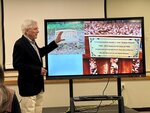Seekonk Superintendent Says No Change to Health Education
Seekonk School Superintendent Rebecca Kidwell said there were will be no changes to the district’s health education policy.
The Massachusetts Department of Elementary and Secondary Education (DESE) has released a 46 page draft of a curriculum framework for Comprehensive Health and Physical Education. DESE is seeking feedback from parents and educators about what should be taught in schools.
“We are making no changes in our schools,” Kidwell told the School Committee Monday. “We absolutely still abide by policies for parents to opt-out of education around human sexuality. We are inclusive of all and we are interested primarily in making sure students and families in Seekonk know that our schools are a place for them.”
DESE outlines seven practices, including decision-making and problem solving, self-management and goal-setting, social awareness, relationship and communication skills, movement skills, and self-advocacy and health promotion.
DESE notes: The standards are presented by grade span: Pre–K-2, grades 3–5, grades 6–8, and grades 9–12. The standards are considered learning goals that are intended to be achieved by the end of each grade span, respectively. Within each grade span, the standards are grouped by practice. This reflects the importance of the practices for students across the disciplines of health education, physical education, and in developing social emotional competencies. Finally, within each practice, the standards are grouped by the following topics. A sample organization is shown below.
- Gender, Sexual Orientation, and Sexual Health [GS]
- Healthy Relationships [HR]
- Mental and Emotional Health [MH]
- Nutrition and Balanced Eating [NE]
- Personal Safety [PS]
Some of the standards for pre-kindergarten through Grade 2 include:
- Discuss gender-role stereotypes and their potential impacts on people of all genders.
- Demonstrate empathy and ways to treat all people with dignity and respect
- Explain how no one has a right to violate personal boundaries, and demonstrate an appropriate refusal (e.g., tell a trusted adult, say NO, leave the situation) when someone says or does something that does not respect personal boundaries.
- Discuss stereotypes, prejudice, discrimination, equality, and inequality and how these can affect relationships and situations.
- Demonstrate awareness of, and ways to show respect for, all types of families (e.g., families with heterosexual parents, families with same-gender parents, single parent families, intergenerational families, adoptive families, foster families).
“I think it’s imperative that the public does understand what this framework contains,” said committee member Kyle Juckett. “(The draft) starts with pre-K to second grade. It targets gender discussion and discussion of personal boundaries including sexual discussion.”
Chairperson Meaghan Mahoney admonished Juckett, noting the committee was not going to engage in a discussion of the DESE report.
Committee member Noah Escaler said the committee needed to have a work session about DESE’s suggestions.
During the public comments portion of the meeting, Juckett said the prospect of different types of sexual intercourse being discussed with elementary school students was not appropriate.
“I have a third grader (in school) and I would be very upset if someone was going to start talking to my little girl about sexual intercourse,” Juckett noted. “Let’s be fair. Sexual intercourse encompasses many different styles of sexual intercourse so I don’t want any of that before (my daughter). These are conversations that will typically happen in the home when they need to be, not to six year olds, not to seven year olds, not to ten year olds.”
DESE’s CHPE report can be accessed at: https://www.doe.mass.edu/sfs/healthframework/

















Comments
No comments on this item Please log in to comment by clicking here